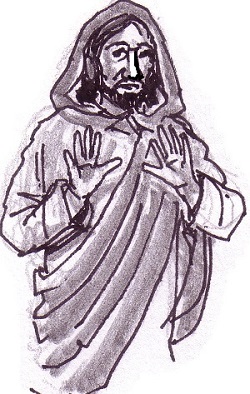

“He rebuked them and directed them not to tell anyone” (Luke 18:21).
Watching today’s candidates for office hone their campaigns, it is clear that their most important concern is how the public perceives them and their message. They spend huge amounts of money on carefully crafted commercials and seek to control media interpretations of their positions on issues. Any gaffes or misstatements on TV can go viral and wreck their chances. They must also respond quickly to negative views generated by their opponents to undercut their standing in the polls.
Jesus never had to contend with saturated media coverage, but he did have to insist that the crowds, his critics or even his own disciples not distort his true identity and mission. In today’s Gospel selection, he conducts his own informal poll by asking Peter and the other disciples what people were saying about him and who they thought he was. Popular views were that he was John the Baptist back from the dead, or that he was the prophet Elijah, who was thought to reappear when the Messiah was coming.
It was this rumored arrival of the Messiah that most concerned Jesus, because most people thought of him as a military ruler who would overthrow the Romans and restore the kingdom of David. When Peter called Jesus “the Christ” he was likely thinking of this kind of Messiah. Jesus rejects this image and rebukes his disciples for promoting it. From his time in the desert after his baptism, Jesus has known that his role will be that of the “suffering servant” of Isaiah.
So he strongly reminds Peter and the others that when they get to Jerusalem, he will suffer greatly, be rejected by all the leaders and be killed. It is a shocking message, but he adds that after he has fulfilled his mission he will be “raised on the third day,” another way of saying that God will bless his sacrifice with victory. We cannot imagine their reaction or the fate of any contemporary leader who undercuts his or her own campaign for office by saying that they will succeed by first failing utterly and disastrously.
The paradox of suffering and death is the heart of the Christian identity and mission. When each of us was baptized, we signed on to die with Christ in order to rise with him. This paschal mystery of death and resurrection is the pattern of our own growth in self-emptying love and the promise of God’s grace at work in us to help redeem the world. No one will succeed or complete their discipleship without losing themselves for the sake of others. History bears out the truth that the greatest people who ever lived have all sacrificed themselves for the common good. We call them saints or heroes or champions of the great causes of justice and human development. We honor them for laying down their lives out of love, even as other ambitious and self-serving figures go down in ignominy or into the dust as cautionary tales.
What a strange, even shocking victory we seek as Christians, and how mysterious is the Jesus we remember and celebrate each time we stand around the altar and break bread and share the cup.
Advertisement








